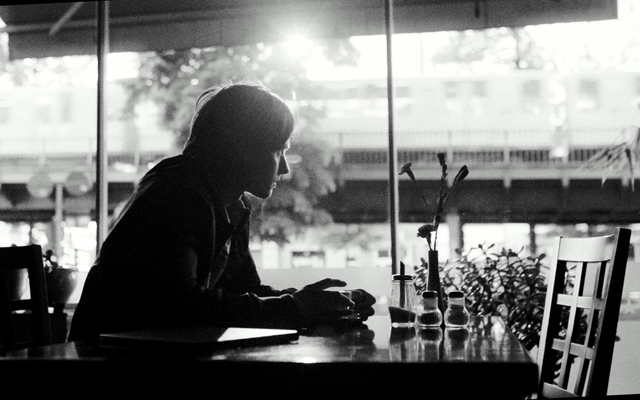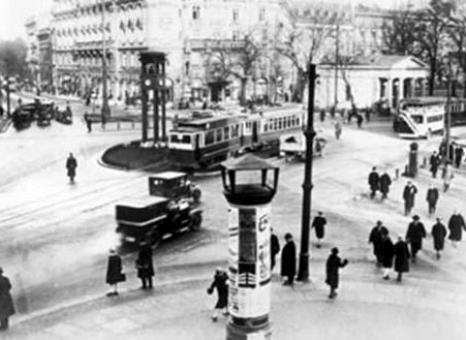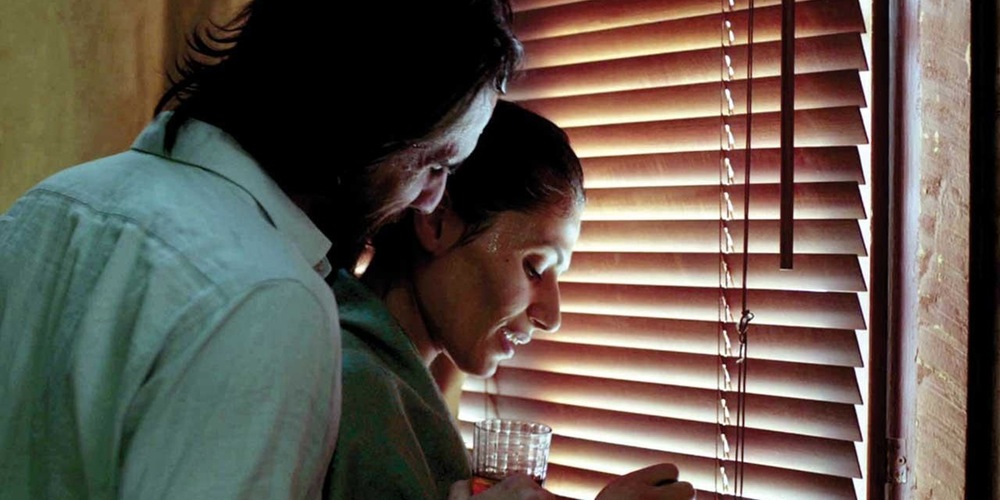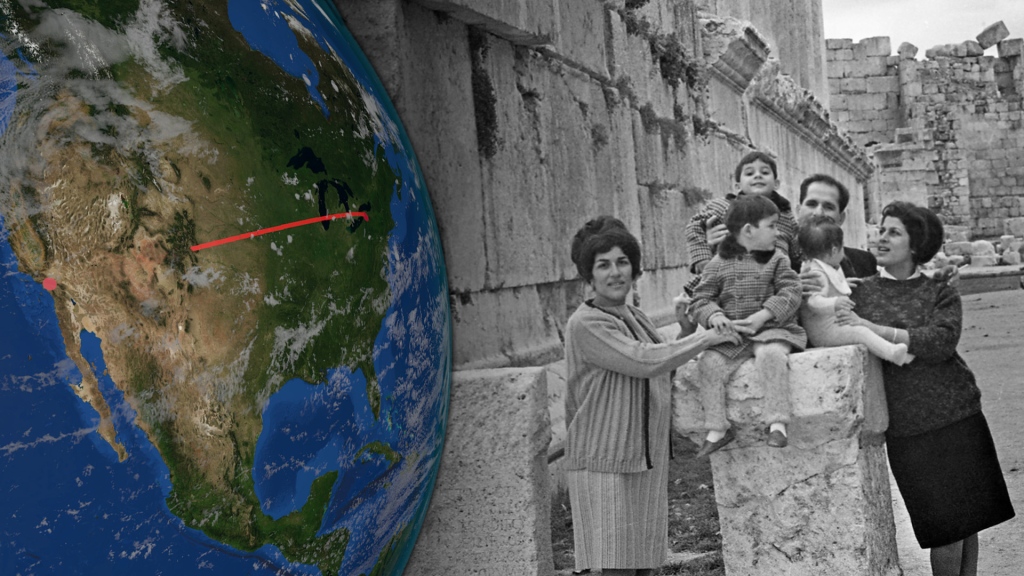The 19th Berlin & Beyond Film Festival—ganz frisch German language film, starts Thursday, January 29 at the Castro
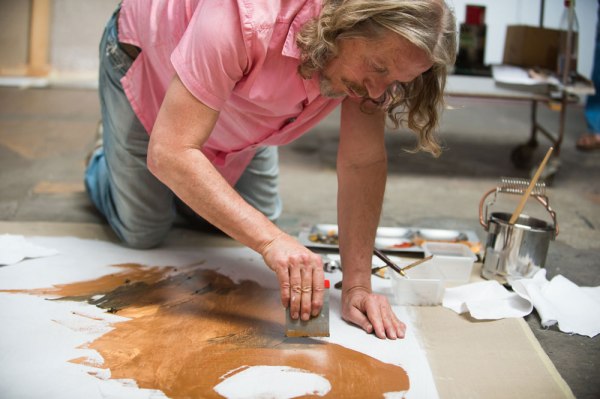
It’s ironic that 58-year-old German Wolfgang Beltracchi looks like Alfred Durer. Beltracchi masterminded one of the most lucrative art scams in postwar European history. For decades, this self-taught painter, and self-proclaimed hippie, passed off his own paintings as newly-discovered masterpieces by Max Ernst, André Derain, Max Pechstein, Georges Braque, and other Expressionists and Surrealists from the early 20th century. His wife, Helene Beltracchi, along with two accomplices, created convincing backstories and sold the paintings for six and seven figures through auction houses in Germany and France, including Sotheby’s and Christie’s. One fake Max Ernst hung for months in a retrospective at the Metropolitan Museum of Art. In 2004, Steve Martin purchased a fake Heinrich Campendonk for $860,000 through a Parisian gallery. Arne Birkenstock’s “Beltracchi: The Art of Forgery” (“Beltracchi: Die Kunst der Falschung,” 2014), features the larger than life Beltracchi sharing his secrets; those he duped sharing their dismay; and those who caught him talking about the painting that blew it all up. This fascinating Lola award winning documentary screens Sunday, Feb. 1, at 11 a.m., at the Castro Theater at the 19th Berlin & Beyond Film Festival, (Jan 29-Feb 3) which showcases over twenty of the newest and best German language films at the Castro and other select Bay Area venues. Image: Arne Birkenstock
One film festival stands above most for consistently awesome programming—the annual Berlin & Beyond Film Festival, which features the best new films by German, Austrian and Swiss directors and the crème of the crop of international collaborations from directors working beyond these borders. The focus is German language cinema but it’s the exceptional storytelling, intense drama and highly cinematic nature of the films, and the complete abandonment of Hollywood special effects, that make this festival a stand-out. The 19th Berlin & Beyond kicks off Thursday evening, January 29th, with a dazzling roster of tributes and special guests onstage and screenings of 20 feature length films and 4 shorts, including a healthy number of premieres. Festival director Sophoan Sorn, at the helm for his fifth year now, has collaborated with Festival president Sabine Erlenwein to select films that showcase this year’s theme “In Search of Truth”—cinematic journeys that connect us with life-affirming and thought-provoking stories on life, love, loss and memory.
It all begins Thursday evening at San Francisco’s historic Castro Theatre with a tribute to the legendary Bavarian actress Hannelore Elsner, Germany’s Catherine Deneuve, who has delighted film, television and theater audiences for the past 50 years. I was introduced to her in 1994, when I was in Köln, and became addicted to the popular tv detective series, Die Kommissarin (The Inspector), where she played the brash and bruised by life Inspector, Lea Sommer, becoming the first female to play the role of a police inspector on German television. Berlin & Beyond 19 will present Elsner with a Lifetime Achievement Award for Acting, celebrating her extraordinary career. A special tribute program will lead the Opening Night screening of her latest film To Life! (Auf Das Leben, 2014). Following the screening, the festival kicks off with an Opening Night Party at Tank18, one of the City’s finest wine bars. The festival closes at the Castro venue on Sunday with Doris Dörrie’s The Whole Shebang (Alles Inklusive, 2014), with both Elsner and Dörrie in attendance.
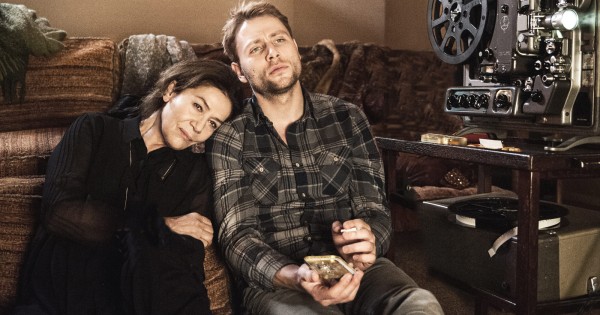
German director Uwe Janson’s feature “To Life” (“Auf Das Leben,” 2014) has its US premiere Thursday evening when it opens the 19th Berlin & Beyond Film Festival. German actress Hannelore Elsner will be honored with a Lifetime Achievement Award. Elsner stars as a Jewish cabaret singer, down on her luck, in an unlikely love story with Max Riemelt, who plays Jonas, a 29-year-old on the run who arrives in Berlin just in time to save Ruth’s life. The film is an adaptation of Stephen Glantz’s “If Stones Could Cry.” Hannelore Elsner closes the festival too, with Doris Dörrie’s “The Whole Shebang” (“Alles Inklusive” 2014), an offbeat modern comedic romance set in Spain where Elsner plays an aging free-spirit recouping from hip surgery who decides to return to the Spanish beach where she spent the Summer of Love, 1967. Image courtesy: Berlin & Beyond
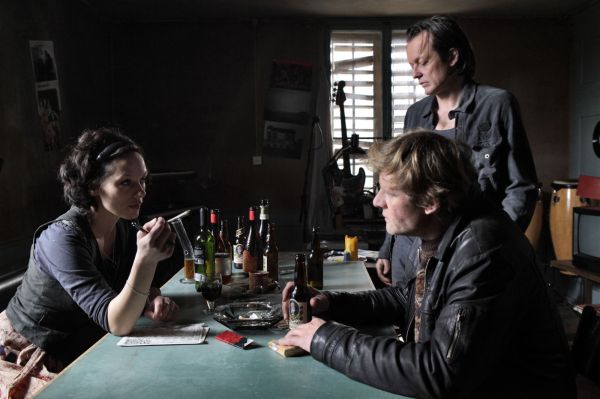
“I Am the Keeper” (“Der Goalie Bin Ig”), the winner of four 2014 Swiss Film Awards, including Best Film, screens 4 PM Saturday, at the Castro, with director Sabine Boss in attendance. Set in the late 1980’s, hedonist Ernst (Marcus Signer, 2014 Swiss Film Award Best Actor), whom everyone calls “Goalie,” returns to his small hometown of Schummertal after a year in prison. He wants a new start, this time without drugs. He looks for a job and falls in love with Regula (Sonja Riesen), a waitress who has a stabilizing impact. But just as this strong-willed and somewhat naïve man seems to have gotten on the right track, his past catches up with him and the claustrophobic atmosphere of this small town closes in to suffocate him. A dark comedy, rich in nuances, the film is an adaptation of Pedro Lenz’s award-winning 2010 novel of the same name. The film is spoken in Bernese German, the dialect of High Alemannic German spoken in the Swiss plateau (Mittelland) part of the canton of Bern and in some neighboring regions.
This year, German actor Ronald Zehrfeld will be honored with the first-ever Berlin & Beyond Film Festival Spotlight Award in Acting and three of his latest films will be screened—Inbetween Worlds (Zwischen Welten, 2014), The Kings Surrender (Wir Waren Könige, 2014) and Phoenix (2014). The Spotlight Award will be presented on Friday, January 30, at the Northern California Premiere of Inbetween Worlds, at the Castro.
Berlin & Beyond continues to bring rare gems to its audiences, including the first-ever international screening of Marcus H. Rosenmüller’s Best Chance (Beste Chance, 2014), and the North American premiere of the four-time Swiss Film Award winner, I Am The Keeper (Der Goalie Bin Ig, 2014) with director Sabine Boss in attendance. Also lighting up the screen are highly-anticipated works from the festival circuit: Austrian auteur Jessica Hausner’s Cannes selection Amour Fou (2014); Swiss filmmaker Peter Luisi’s Locarno Audience Award winner, Unlikely Heroes (Schweizer Helden, 2014); Oscar-winner Caroline Link’s return to Africa with the father-and-son journey film, Exit Marrakech (2014) as the festival Centerpiece. Samuel Schneider, who plays 17 year-old-Ben will be in attendance.
In addition to the main Castro Theater venue, there are additional screenings on Feb 1-2 at the Goethe-Institut SF (530 Bush Street), Feb 2 at the Aquarius Theater, Palo Alto, and Feb 3 at the California Theatre, Berkeley.
For more information and tickets, browse the festival’s official website and stay tuned to ARThound for additional coverage.
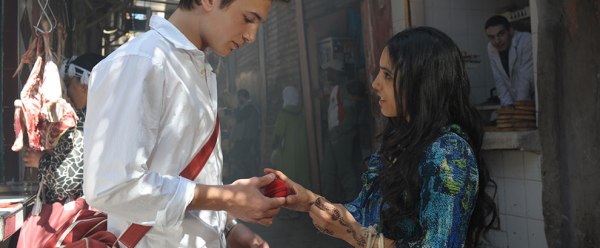
In German filmmaker Caroline Link’s finely crafted “Exit Marrakech” 17-year-old Ben (Samuel Schneider) travels to Marrakech during the summer holidays in order to spend time with his divorced father Heinrich (Ulrich Tukur), a celebrated director who is staging his latest play there. Ben, who has the suite of attitude issues accompanying his age, is fed-up with his father and strikes out on his own with two members of Heinrich’s local crew only to connect with a young prostitute, Karima (Hafsia Herzi), in a seedy nightclub. He accompanies her to her remote village in the Atlas Mountains where her conservative family does not take a liking to him. While Ben is out exploring, Heinrich grows increasingly worried and comes looking for him. What ensues is a father son road-trip, as much an emotional journey as a captivating declaration of love to the smells, music, colors and moods of Morocco.
The Line-up for the 19th Berlin & Beyond Film Festival:
CASTRO THEATRE
Thursday, January 29, 2015
6:30 pm Opening Night Film: TO LIFE!
9:15 pm STEREO
Friday, January 30, 2015
10:00 am RUN BOY RUN
1:30 pm MACONDO
4:00 pm MY SISTERS
6:30 pm INBETWEEN WORLDS
9:15 pm THE KINGS SURRENDER
Saturday, January 31, 2015
11:00 am ALPHABET
1:00 pm THIS LOVELY SHITTY LIFE
4:00 pm I AM THE KEEPER
7:00 pm EXIT MARRAKECH
10:00 pm DARK VALLEY
Sunday, February 1, 2015
11:00 am BELTRACCHI – THE ART OF FORGERY
1:00 pm UNLIKELY HEROES
3:30 pm AMOUR FOU
6:00 pm BEST CHANCE
8:30 pm THE WHOLE SHEBANG
GOETHE-INSTITUT AUDITORIUM, San Francisco
Sunday, February 1, 2015
1:00 pm MISSION SPUTNIK
3:00 pm MIND TRIPS Shorts 2015
5:30 pm VULVA 3.0
Monday, February 2, 2015
6:00 pm CONCRETE LOVE – THE BÖHM FAMILY
8:00 pm MY SISTERS
CALIFORNIA THEATRE, Berkeley
Tuesday, February 3, 2015
5:00 pm BELTRACCHI – THE ART OF FORGERY
7:00 pm BEST CHANCE
9:15 pm INBETWEEN WORLDS
Details: The 19th Berlin & Beyond Film Festival runs Thursday, Jan 29-Sunday, Feb 1 at the Castro Theatre, 429 Castro Street (near Market), San Francisco; Sunday; Sunday, Feb 1-2 at the Goethe-Institut, 530 Bush Street, San Francisco; Monday, Feb 2 at Aquarius Theatre, 430 Emerson St., Palo Alto and Tuesday, Feb. 3 at the (Landmark) California Theatre, 2113 Kittredge St., between Oxford and Shattuck, Berkley.
The 17th Berlin & Beyond Film Festival showcases the best new films from Germany, Austria and Switzerland, starts next Thursday, September 27, 2012

Christian’s Petzold’s “Barbara,” opens the 17th Berlin & Beyond Film Festival at the historic Castro Theatre, September 27-Ocotber 4, 2012. Set in East Germany in 1980, and starring Nina Hoss, the film is the German contender for this year’s Academy Award for the Best Foreign Film. Image courtesy: Hans Fromm.
For film lovers in the Bay Area, the annual Berlin & Beyond Film Festival is an essential—it’s where one goes to see the very best new films by German, Austrian and Swiss directors and the crème of the crop of international collaborations from directors working beyond these borders. The focus is Germany and German language but it’s the exceptional storytelling, intense drama and highly cinematic nature of the films, and the complete abandonment of Hollywood special effects, that make this relatively small scale festival such a stand-out in the myriad of festivals that are cropping up everywhere. The festival will mark its 17th season with a dazzling roster of special guests onstage and will screen 26 feature length films and 6 shorts, including four North American premieres and three US premieres. It will pay special tribute to legendary stage and screen star Mario Adorf with a Lifetime Achievement Award for his work in acting. Mr. Adorf will be present at the festival to receive the award and will appear in person for two films of his four-film tribute. It all begins next Thursday, September 27, and runs through October 4, 2012, in San Francisco at the historic Castro Theatre, with additional screenings at the Goethe-Institut SF (530 Bush Street).
The festival will mark its 17th season with a dazzling roster of special guests onstage. It will pay special tribute to legendary stage and screen star Mario Adorf with a Lifetime Achievement Award for his work in acting. Mr. Adorf will be present at the festival to receive the award and will appear in person for two films of his four-film tribute. Also attending are Alina Levshin, the German Ukranian star of David Wendt’s Combat Girls (Kriegerin) which screens Wednesday October 3 and won Best Film (Bronze), Best Screenplay and Best Actress in the 2012 German Film Awards, and sensational directors Veit Helmer and Anno Saul and many more. Stay tuned to ARThound for coverage.
Festival Highlights:
Opening Night: On Thursday, September 27th, the festival’s Opening Night screens Berlin school writer/director Christian Petzold’s Barbara, winner of both the 2012 Berlinale Silver Bear for Best Director and the 2012 German Film Award’s Best Film. This masterful period film is set in the very restrictive GDR in the 1980’s and stars Nina Hoss in a brilliantly nuanced performance as an accomplished doctor in East Berlin’s largest clinic who has been transferred to a rural medical clinic following her application for an exit visa to the West where she hoped to join her lover Jörg (Mark Waschke). She is forced to choose between personal freedom and saving the lives of others and her growing affection for André (Ronald Zehrfeld), her new supervisor. Barbara is Germany’s entry to the Academy Awards Best Foreign Film category.
Director Christain Petzold is Germany’s most acclaimed director (Yella (2007), Jerichow (2008), Dreileben (2001) a key figure in the Berlin School and he’s from the former GDR, meaning he nails the physical details and psychological ambiance with authenticity. His camerawork is exceptional too in enforcing the drama—the camera is held just below eyelevel throughout most of the film and the scenes meld into one another. His collaboration with Hoss began in 2003 with Something To Remind Me; two years later she appeared in his Wolfsburg, for which she won the Adolf Grimme Award; in 2007, she starred in his Yella, winning the Silver Bear for Best Actress in 2007 and the German Film Award in 2008. In Barbara, Petzold gives her a challenging role he created especially for her, while capturing her regal and haunting beauty against a backdrop that is austere but vividly humanized by his own history. You’ll probably be able to see Barbara screening elsewhere in the Bay Area several months later but nothing beats seeing a film early in a setting like the Castro.
Following the screening, the Opening Night party begins 9:15 PM on Castro’s beloved Mezzanine, where film fans are invited to celebrate the start of another great year with delicious German beer and wine and delectable amuse-bouche.

Legendary German actor Mario Adorf (left) stars in “The Rhino and the Dragonfly,” which has its world premiere at the 17th Berlin & Beyond Film Festival. Adorf will receive the festival’s Lifetime Achievement Award in Acting on Friday, September 28, 2012. Image: NFP/COIN Film.
Mario Adorf Tribute: New German Cinema is unthinkable without the legendary German actor Mario Adorf. In addition to The Tin Drum (1978) and Lola (1981), Adorf was integral to Roland Klick’s Deadlock (1970), Volker Schlöndorff’s The Lost Honour of Katharina Blum (1975), Reinhard Hauff’s The Main Character (1977), and the omnibus movie Germany in Autumn (1978). Adorf has played more than 200 roles in cinema and television and the tally of directors he has worked with reads like a hit list of world cinema: Sam Peckinpah, Franco Rossi, Wolfgang Staudte, Edgar Reitz, Billy Wilder, Helmut Dietl, Rainer Werner Fassbinder, Claude Chabrol and Sergio Corbucci and Volker Schlöndorff.
The festival will honor Adorf with a lifetime achievement award in acting at the international and North American premiere screening of his most recent film The Rhino and the Dragonfly (2012) directed by Loal Randl, on Friday, September 28th at 6:15PM. It will screen three more of his classics—the recently released director’s cut of The Tin Drum (Saturday Sept 29th, 8:45PM), Ship of the Dead (Friday, Sept 28th, 4:30PM) and Lola (Tuesday, Oct 2nd, 6:00PM). Mr. Adorf participate in a Q&A following the special screening of The Tin Drum. Berlin & Beyond’s Lifetime Achievement Award was last given to Wim Wenders in 2009. This is the first time Mr. Adorf has been honored at a major US Festival.
The Late Show: Alexander Sokurov’s Faust, winner of the prestigious Golden Lion at the 2011 Venice Film Festival screens Friday at 9 PM. The Russian director is most known for his historical feature film, Russian Ark (2002), which made a big splash at 2002 Cannes Film Fesitval and was filmed entirely in the Winter Palace of the Russian State Hermitage Museum and was a single 96-minute continuous unedited shot.

Alexander’s Sokurov’s “Faust” screens Friday, September 28, 2012, at the 17th Berlin and Beyond Film Festival. The psychologically jolting film won the prestigious Golden Lion at the 2011 Venice Film Festival and retells Goethe’s classic fable with some hellish twists. Image: courtesy Films Boutique
Faust is the fourth and final film in his mesmerizing tetralogy of films about the evil that is borne out of too much power and it follows Moloch (1999) about Hitler, Taurus (2001) about Lenin, and The Sun (2004) about Emperor Hirohito. The psychologically jolting Faust stars the Austrian Johannes Zeiler as Faust and Russian Anton Adasinskiy as an utterly creepy and misshapen pawnbroker/Mephistopheles and retells Goethe’s classic fable with some hellish twists that will have you experiencing disturbing flashbacks for days. The obsessive and impoverished Dr. Faust hungers for knowledge about the human soul and dissects human corpses in a futile attempt to its locus. When he falls in love with a beautiful young woman, Margarete (Isolda Dychauk), he grows obsessed and cuts a deal with the moneylender, signing over his soul to possess her. Sokurov’s distinctive visual mark is his sepia-bathed cinematography and stunning lighting and it’s present in spades here. What he’s chosen to emphasize though isn’t pretty—the film opens with a full on shot of a corpse’s penis and heaps of entrails and, from there, takes us straight into the highly unsanitary 16th century. But it is Faust’s extreme loneliness and his desire for connection that grips us and we accompany him on this sick hallucinatory eternal journey crafted so impeccably by Sokurov. The existential film is a dark meditation on many things but Sokurov takes a few jabs at Germany. If you’re going to see it, take someone along to process it with afterwards…it will help.
Centerpiece Screening: The Festival’s Centerpiece screening, Baikonur (2011), Veit Helmer’s newest comedy, is about a young Kazakh man obsessed with outer space and with a beautiful French space traveler whose capsule crash lands in a field in Khazakstan near his yurt. The rest unfolds like a fairy tale in the countryside—he carries the unconscious beauty to his yurt and wakens her with a kiss but she has amnesia and isn’t herself when she agrees to marry him. Helmer will appear at the festival for a Q&A about the largely Kazakh production, which proceeds in Russian and English. (Screens Saturday, September 29, 2012 at 6:15 PM)

Marten Persiel’s “This Ain’t California” is the closing film of the 17th Berlin & Beyond Film Festival. The documentary looks at the underground skater culture in East Germany in the 1980’s. Director Persiel and Producer Ronald Vietz will attend the screening, which is also the film’s California premiere. Image courtesy: Harald Schmitt.
Closing Night Film: Marten Persiel’s This Ain’t California (2012) was a big success at the 2012 Berlinale where it won the “Dialogue in Perspective” award. The film takes place in the 1980s, the last years of the GDR and tells the hair-raising story of one of the first skateboarding crews behind the Berlin Wall. Drawing from Marten Persiel’s background as a commercial director, this first feature combines classic skate footage, kitschy commercials and first-person interviews to insightfully draw the audience into the maelstrom of excitement and controversy surrounding the sport’s early years in East Germany. In Kate Gellene’s interview with Persiel on May 29, 2012, which appears in Rooftop Films (click here), Persiel says, “I started skating 29 years ago as a little kid in western Germany and never really stopped. I am super grateful for the friends I made in all those years and for the stuff I experienced skateboarding. It’s been a life vest and a guide through life… In the film, there is a sense that stupidly goofing around on the streets can shape whole biographies. It’s how you look at your city, the buildings around you, the streets. It’s how much you allow yourself to say ‘this is my world too, I want to play here’. To think like that could basically get you arrested in a totalitarian and militarized system like the GDR. … oh wait.. it can get you arrested in NY too! Hm.”
Closing Night party: After the screening, the closing night bash takes place at 9:30 pm on the Castro Mezzanine, celebrating the conclusion of another year of innovative programming with an assortment of local tastes and German drinks in the company of director Persiel, producer Ronald Vietz and other special guests in attendance.
ARThound’s Picks:

As the only human survivor after an unexplained global tragedy, German actress Marina Gedeck bonds tightly with her loyal dog in Julian Roman Pölsler’s “The Wall” a film that is true to Marlen Haushofer’s exceptional novel. Image: courtesy of Music Box Films
The Wall (Die Wand): Austrian director Julian Roman Pölsler’s film is based on Marlen Haushofer’s 1962 dystopian hit novel of the same name (about to be re-printed in English later this year). The film stars German actress Martina Gedeck from the brilliant 2006 Stassi thriller The Lives of Others (Das Leben der Anderen) and tells the story of a completely ordinary middle-aged woman (Gedeck) who is vacationing with friends in a remote mountain hunting lodge. Her friends go out to a pub and she stays back with the dog and when they don’t come back, she makes a very creepy discovery. She is imprisoned on the mountainside by an invisible wall, behind which there seems to be no life. She appears to be the sole remaining human on earth, along with the dog (a red hound that will steal your heart), a cat, some kittens, and a cow, with which she forms a tight-knit family.
The film rests entirely on Gedeck’s shoulders and she is riveting, delivering a very credible performance that will leave you shivering and running home to snuggle with your dog. The odd beauty of this film is that this last survivor scenario may be your own romanticized idea of heaven, or hell (Who hasn’t said “Fuck the world! I’m sick of people…give me just my dog!), but watching Gedeck use her time laboring hard, protecting her pack, and introspectively processing her life, leads us to right into her moments of intensely felt angst, terror, joy and sorrow. (Screens Sunday, September 30, 2012 at 4 PM, Castro Theatre)

Max Hubacher (left) stars in Swiss director Markus Imboden’s “Foster Boy” (“Der Verdingbub”), which has its US premiere at the 17th Berlin & Beyond Film Festival. Image courtesy: Global Screen.
Foster Boy: Markus Imboden’s Foster Boy (Der Verdingbub), the most successful Swiss film of the last 5 years, has its US premiere at the festival. The film is set in the 1950’s and revisits a dark and nearly forgotten period in the Switzerland’s recent history, when the government occasionally intervened to take children from parents who were deemed unfit, depriving them of custody, and sending their children to work, mainly on farms, a practice that lasted from the early 1800s until the 1960s. The story is focused on a young orphan, Max (Max Hubacher), who was sold to the Bösiger family of poor farmers and on another “Verdingbub,” (contract child) in that family, Berteli, a girl who was taken from her impoverished widowed mother. The gripping story follows the miserable life of physical, emotional and sexual abuse that the children underwent in a household that was supposed to provide foster parenting but instead used them as slave labor.
Hubacher, Switzerland’s 2012 Shotting Star award winner, gives a brilliant and nuanced performance as the emotionally and physically brutalized Max, whose only solace is his accordion and his dream of escaping to Argentina. Through its story, the film directly exposes and challenges a grave injustice. It also highlights the important role that an observant and caring outsider can play in reporting abuse IF the authorities to whom the complaint is made are not themselves complicit. Stay tuned to ARThound for a full review. (Screens: Saturday, September 29, 2012 at 4 PM, Castro Theatre)
Festival Details: The 17th Berlin & Beyond Film Festival is September 27-October 4, 2012 at the Castro Theatre, 429 Castro Street (at market Street) in San Francisco. Parking can be difficult. Allow AMPLE time to find parking if arriving by car. Some programming is at the Goethe-Institut SF Auditorium (530 Bush Street (at Grant). Tickets: Price varies per program ($12 for most Castro Theatre screenings and $10 for most Goethe-Institut screenings). Advance tickets for all shows are available at Brown Paper Tickets. Online ticket sales end 10:00 pm prior to the day of show for each film. For information on purchasing advance tickets and day of show tickets in person at the Goethe-Institut or at the Castro Theatre, click here.
Film Review: Elisabeth Scharang’s “In Another Lifetime,” an Austrian period film of operetta and audacity premieres at the 31st San Francisco Jewish Film Festival, July 21 –August 8, 2011

Ursula Strauss (right) delivers an intense performance as Traudl Fasching, in the West Coast premiere of Elisabeth Scharang’s debut feature film “In Another Lifetime.” Fasching is a sympathetic Austrian farmer's wife in whose barn 20 emaciated Jewish prisoners are camping. Franziska Singer (left) plays Poldi, the family maid, whose boyfriend, an SS officer, is missing. Image courtesy of SFJFF31.
Austrian documentarian Elisabeth Scharang’s debut feature film In Another Lifetime makes its West Coast premiere at the 31st San Francisco Jewish Film Festival. Set in Austria in April 1945, during the chaotic final days of World War II, the film is one of the festival’s most interesting offerings and from its opening scene, cast in the natural light of the Austrian Alps, there is no turning away. Its subject matter—an operetta performance that offers hope and healing to both Jewish prisoners and their captors— hasn’t been tackled before in Holocaust film. Subplots of forbidden love, a marriage numbed by the devastation of losing a child, and risk-taking to do what’s inherently right pitted against insidious conformity all add up to a compelling story set within an ominous larger picture of mass death and evil. What sets this fictional period film apart, though, is its use of the palliative experience of music, specifically opera, as an escape from the surreal experience of war. The film is based on a play by screenwriters Silke Hassler and Peter Turrini.
The story begins as a group of 20 exhausted and starving Hungarian Jews are led on a forced death march by the German Wehrmacht through the back provinces of Austria towards the Mauthausen concentration camp. After a brief rest, an elderly prisoner refuses to fall back into line and marches off and is shot dead. One emaciated young man, with a mop of dark hair, plays a few piercing stanzas on his violin. Music is the connective tissue of this film and Scharang uses it brilliantly throughout.
Because the Wehrmacht are seeking to evade the approaching Red Army, they leave the small group of Jews stranded in a tiny Austrian village and entrust them to the village policemen and the Volkssturm (the “storm of the people” or people’s army, Hitler’s last ditch defense in WWII). Typically for this period, rural populations, now unbound from the authority of superiors, treated the Jews according to their own personal characters and beliefs, with results ranging from the kindest examples of generosity to the cruelest acts of barbarism. This group is locked in the hay barn of the Faschings, an embittered farmer and his sullen wife (Johannes Krisch and Ursula Strauss, paired again after their brilliant performances in Revanche, [2009, Austria], nominated for the Academy Award for Best Foreign Language Film). Exhibiting compassion and bravery, it is the maid Poldi (Franziska Singer) who first defies the rules to feed and communicate with the prisoners and then pulls in Traudl Fasching (Ursula Strauss), who is soon giving them all of her bread and soup and listening to their music.
The French cinematographer, Jean-Claude Larrieu masterfully bathes each scene in natural light, infusing even the most humdrum kitchen work and chores with Vermeer-like drama. The characters’ plain clothing, pale household interiors, stark barn and compositions all back up the Vermeer-like atmosphere, creating a series of mundane yet monumental freeze-frame portraits.
As is fairly typical in Holocaust literature and film, the inspirational figure who steps forward to buoy spirits is an artist—recall Adrian Brody, the title character in The Pianist [2002, USA]. When Péter Végh, as charismatic Hungarian tenor Lou Gandolf, senses the women’s compassion, he outlandishly proposes that their motley group stage Wiener Blut, a Strauss operetta, for the locals, and convinces them all that art for art’s sake—the humanity of music–is all that remains in this bleak situation. Gandolf’s curious display of sheer pluck is balanced by his character’s intuitive ability to be completely passive when necessary.
Hell breaks loose when Stefan Fasching (Johannes Krisch) discovers what his wife is doing in the barn and the great risk it poses for them in this tightly-knit community. It’s almost impossible to take your eyes off of Kirsch, who delivers a particularly intense performance as a man so hardened by the loss of his son that he too might as well be facing death. He is still deeply affected by music though, and once his fingers find their home on his old accordion, he softens and offers to play in the production.

Austrian filmmaker Elisabeth Scharang’s debut feature film “In Another Lifetime” takes place in a hay barn in an Austrian village where stranded Jewish prisoners prepare to stage a version of the beloved operetta Wiener Blut, hoping to win the protection of the locals. Photo courtesy: SFJFF31.
Carefully selected music is one of the film’s most appealing features. The operetta Wiener Blut (literally “Viennese Blood” or “Viennese Spirit”) evokes both soft nostalgia as well as the indomitable Viennese spirit and will to survive, which encompasses the prisoners’ situation as well. The operetta is named after the spirited “Wiener Blut Waltz” (Op. 354) by the 19th –century “waltz king” Johann Strauss, Jr. composer of such frothy classics “The Bue Danube” (“Die Schönen Blauen Donau”), “The Emperor Waltz” (“Kaiser-Walzer”), and the operetta Die Fledermaus. Strauss waltzes remain the most powerful signifiers of old Vienna, nostalgically evoking the lost glory days of the Austro-Hungarian Empire, a time during which the Austrians retreated into light-hearted celebration of old-fashioned culture as a way of ignoring change. Emblematically, Wiener Blut unfolds against the glittering backdrop of the Congress of Vienna (November 1814- June 1815), a meeting of the Great Powers of Europe to agree upon the boundaries of post-Napoleonic Europe, but the operetta’s plot focuses entirely on the philandering of an Ambassador-Count who represents a tiny principality attending the Congress. In Another Lifetime also makes canny use of the title song of Rose Marie by Czech-born composer Rudolf Friml, a Viennese-style American operetta regarded as frivolous pop music at the time. Here it is played endlessly by an otherwise insignificant young Volkssturm officer who sequesters himself inside a seized home with a confiscated gramophone.
What finally transpires in this story makes In Another Lifetime one of the most gripping assemblages of character studies among the festival’s offerings. Elisabeth Scharang gradually and masterfully infuses us with hope, despite the forces of evil advancing just outside the barn. In the end, as we are left morally outraged, a beautiful and unforgettable image set some 60 years after the film’s main action ends shifts our thoughts to the responsibility and burden of those who witness mass violence. And a Strauss’ waltz, which has insistently worked its way into our subconscious, plays over and over again in our heads.
In Another Lifetime: Austria, Germany, Hungary, 2010, 94 min., in German and Hungarian with English Subtitles
Director: Elisabeth Scharang
Screenwriters: Silke Hassler, Peter Turrini,
Cinematographer: Jean-Claude Larrieu
Principal Cast: Johannes Krisch, Péter Végh, Ursula Strauss, Franziska Singer
Details: “In Another Lifetime” screens 4 times at the 31st San Francisco Jewish Film Festival: Tuesday, July 26, 2011, 3:45 PM, Castro Theatre, San Francisco
Tuesday August 2, 2011, 8:55 PM, RODA Theatre (at Berkeley Rep), Berkeley
Wednesday, August 3, 2011, 8:30 PM, Oshman Family Jewish Community Center, Palo Alto
Sunday, August 7, 2011, 1:40 PM, Smith Rafael Film Center, San Rafael
Tickets are $10 to $12.00 and can be purchased online or by phone at 415.621.0523. Tickets are also available for same day purchase at individual screening venues but screenings may sell out in advance. The 31st San Francisco Jewish Film Festival (www.sfjff.org ), July 21-August 8, 2011, is the world’s oldest and largest Jewish film festival, featuring 58 films in all. There are 38 full-length films (23 documentaries and 15 narratives) and 19 shorts (10 documentaries, 1 narrative and 8 animations) from 16 countries. There are many free events too.

